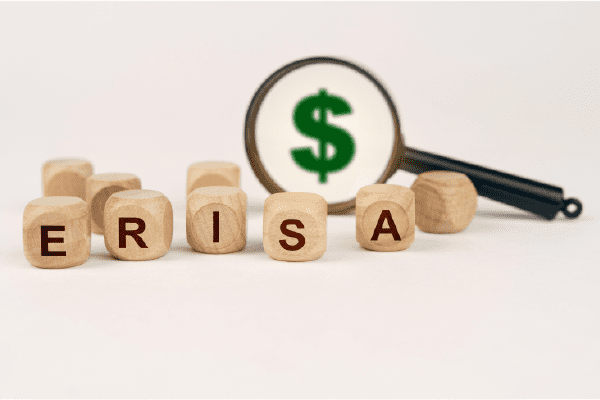Why Retirement Plan Sponsors Need a Fiduciary Advisor

Recent years have seen a sharp rise in the number of lawsuits in which employers were sued for violating their fiduciary duty to prudently select and monitor the investment options included in their retirement plans. Many of the suits have targeted large plans and garnered significant media attention, but small plans have not been immune.
The stakes are high. Conflicts of interest in the retirement plan industry set a settlement record in 2023 of nearly $1 billion. Plans burdened down by litigation is dire news at a time when many are not on track to retire.
As a plan sponsor overseeing an employee retirement plan, you might be wondering how to:
- Identify advisors who truly serve in a fiduciary capacity.
- Manage the risks associated with your fiduciary responsibilities.
- Mitigate potential risks from investment selection and monitoring.
Choosing the right retirement plan advisor is essential not just for reducing your risk as an employer but also for enhancing your employees’ retirement readiness. Unfortunately, the terms “advisor” and “fiduciary” are often used loosely in the industry, making it crucial to dig deeper to understand the distinct roles and responsibilities involved.
The “Prudent Expert” Standard
Retirement plan fiduciaries are held to a higher standard than many other fiduciary relationships, known as the “prudent expert” standard. This means that a plan fiduciary must act with the care, skill, prudence, and diligence that a prudent person familiar with similar matters would exercise. A lack of investment knowledge or understanding of plan administration is simply not acceptable. If in-house expertise is lacking, plan fiduciaries must partner with professional advisors to assist with plan management and fiduciary oversight.
Understanding the Types of Retirement Plan Advisors
Navigating the retirement plan advisory landscape can be challenging, as there is no centralized authority overseeing the titles and roles of financial professionals. While many may call themselves advisors, their qualifications and the capacity in which they serve can vary widely, often resembling that of sales representatives in investment or life insurance.
Complicating matters further, many financial professionals may claim fiduciary status while only being held to a suitability (non-fiduciary) standard. This distinction is critical: a fiduciary standard means an advisor is legally obligated to act in the best interests of their clients, while those held to a suitability standard can recommend products that benefit themselves, even if they are not in the best interest of their clients or retirement plan participants.
After plan committees have sifted through the various business models and compensation structures of different financial professionals, they still face the decision of choosing among three primary types of advisors: consultants, investment advisors, and investment managers. Each of these roles carries a different level of fiduciary liability.
- Consultants: They do not assume fiduciary liability for investment recommendations. While hiring a consultant may appear to establish a solid process for managing plan administration and investment selection, the ultimate responsibility remains with the plan sponsor.
- ERISA 3(21) Investment Advisors: These advisors assume co-fiduciary (limited) liability. While they offer some protection, this arrangement can leave the best interests of plan participants vulnerable to oversight. Conflicts of interest—such as commission-based investments—can lead to excessive fees that ultimately diminish retirement account balances.
- ERISA 3(38) Investment Managers: These professionals take on full fiduciary liability for investment selection and monitoring. This relationship provides complete protection from claims related to poor investment choices, allowing plan sponsors to focus on the selection and ongoing evaluation of the investment manager—a significant responsibility in its own right.
Hiring an ERISA 3(38) Investment Manager
Simply deciding to hire an ERISA 3(38) Investment Manager is not enough. As a plan sponsor, you should consider several factors in your search for a professional who best fits your needs. Not all investment managers offer the same services; some may provide both plan-level and participant-level services, while others may focus solely on one.
Plan-level services may include:
- Investment Policy Statement (IPS) preparation.
- ERISA 404(c) assistance.
Participant-level services might involve:
- Model portfolios.
- Investment education.
To ensure you select the right advisor, consider implementing the following best practices:
- Negotiate an asset-based fixed fee.
- Obtain written acknowledgment of fiduciary status included in the investment manager’s service agreement.
- Look for experience, credentials, transparency, and objectivity.
- Base the advisor’s fee on expertise and value rather than sales skills.
- Choose an advisor who acts as an investment manager to avoid potential conflicts and disclaimers.
When reviewing a firm’s ADV forms, ensure you:
- Eliminate or disclose all conflicts of interest in writing.
- Understand any disclaimers of fiduciary responsibility in writing.
- Require explanations of any potential conflicts of interest.
Seeking Tailored Advice?
If you’re looking for personalized advice specific to your situation, please don’t hesitate to reach out to us today. We’re here to help you navigate the complexities of retirement plan management and ensure the best outcomes for you and your employees.
The information contained in this document is provided for informational purposes only and should not be construed as individualized advice. For individualized advice, please consult with your adviser.




